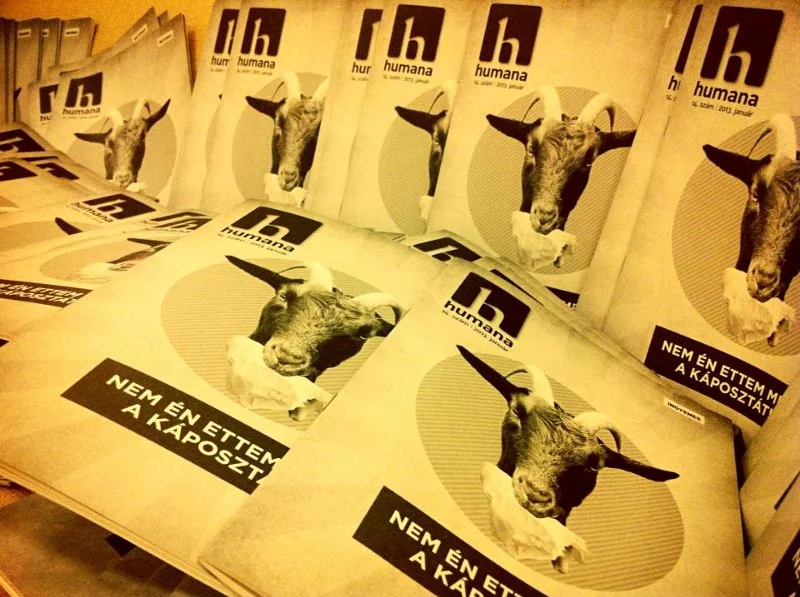Human Rights from Youth to Youth
The mission of the volunteers of Humana human rights journal (or in its Hungarian name Humana Magazin) is to educate and activate young people with regard to human rights and social issues as well as to spread knowledge of other civic organizations and projects. Even though everything has started with a simple idea of a free magazine available to everyone, today the association that has emerged from the magazine has a radio programme and a film club, arranges complex training sessions, and occasionally organizes smaller and bigger events.
Humana Magazin, a Hungarian magazine devoted to human rights, has been written and edited by a small group of enthusiastic young people for three years now. The creator-founder Anna Kertész had worked for several national and international non-governmental organizations before, but she wasn’t pleased with the method practised by them. She wanted to approach the topics of human rights and social issues from another point of view and tell stories of individuals in a completely different way. Therefore, she founded Humana in 2009. The twelve-month-long project was launched as a Youth in Action 1.2 programme on 10 December that year with the support of the European Commission. Twelve issues, two thousand copies per each, were published. Those focused on economic rights, traditions, wars, refugees, livable environment and the rights of generations among others. Despite the seriousness of these subjects, the editors did — and still — not insist on writing in a rigidly academic style rather creating a balance between profoundness and lightness so that both professionals and non-expert, average readers could read meaningful essays and lighter texts.
The highly motivated group continued working after the project had ended, which basically meant the end of the financial support and the offline issues as well. Nonetheless, the members never thought of giving up. They searched for other possibilities and began to concentrate more on the online magazine. The structure detailed above still prevails, but, in addition to that, Humana has broadened its activity field by shooting videos, writing in English, and providing translations of some inspiring articles. Furthermore, having applied to the new marketing trends — with the use of social media sites — Humana is trying to build a more interactive relationship with its readership and introduce itself to other users who might have interests in human rights and/or social issues. However, this effort is being under attack as Facebook, for instance, has started to prioritize paid content, which makes it difficult for NGOs to transmit their messages to their potential audiences.
It’s worthwhile mentioning that Humana does not accept any support from political parties or religious organizations in order to reserve its freedom and independence. The entire association is based on democratic values so no one is being forced to act. Everyone has the right to decide when and how much he or she wants to contribute. Luckily, the people — authors, editors and other volunteers — on board share the passion to ‘objectively reveal the contradictions of the already established stereotypes and the complexities of issues concerning human rights’.
Without this strong and committed collaboration among organizational members, the currently ongoing Youth in Action 1.2 project called Transhumana would have never happened. Transhumana is a sixteen-month-long exchange programme between Hungary and Transylvania, which combines theoretical and practical aspects prolifically. Young people interested in media, human rights and the civil sphere are participating in it so they can gain relevant experience and knowledge before they step into the labour market. Every three months a training meeting is held and an issue is published with two thousand copies printed. The project will end with a conference in 2014. Besides its own large-scale programmes, Humana attends festivals such as Sziget, VOLT, Ördögkatlan, and appears in the media. It regularly holds charity events to help other civic organizations or initiatives such as Klubrádió and Tilos Rádió and organizations that are in more need such as the Igazgyöngy Foundation and the Ambédkar School in Sajókaza.
Humana and its activities have been awarded several times in Hungary. The radio show called Kontúr received the Szegő Tamás medallion. The National Society of Students and Youth Journalists (DUE) chose one of the published Humana Magazin’s covers the best cover of the year in 2010. The Foundation for Democratic Youth (DIA) named Humana the best voluntary project of the year in 2012. Anna Kertész gave a lecture on TEDxYouth@Budapest 2012 — What we need to succeed? with the title of Words Responsibly Undertaken referring to the responsibility that journalists bear.
The vision of Humana can’t be other than trying to establish stable and flourishing relationships with foreign organizations to ‘educate tolerance and the acceptance of diversity’ among people regardless of their origin, ethnicity, age, gender etc.

